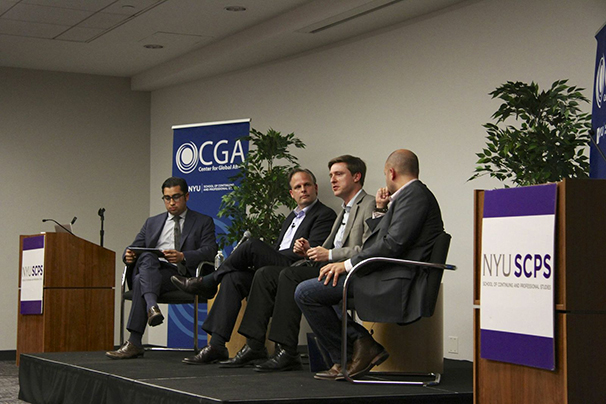
NYU’s Center for Global Affairs, Young Professionals in Energy and the Energy Policy International Club hosted the New York and the Future of Cleantech panel, which is part of the Fueling Our Future: The Geopolitics and Economics of Energy in the 21st Century series. The panel was held on Nov. 5.
The discussion and question-and-answer session took place at 6:30 p.m. at the School of Continuing and Professional Studies’ Woolworth Building facility in Downtown Manhattan.
The three panelists discussed how New York City and its corporate entities should use their global prestige to influence sustainable environmental policy globally. The three panelists were David Gilford, vice president and director of the New York City Economic Development Corporation; Tim Hoffman, metro director of Cleantech Open; and Micah Kotch, executive director of The New York City Accelerator for a Clean and Renewable Economy at the Polytechnic Institute of NYU. Simon Sylvester-Chaudhuri, a master’s student in Global Affairs, moderated the event. The growth of the international cleantech, or clean technology, industry was also a talking point.
“When Alice Eckstein and I were putting the Fueling Our Future series together, we thought about how to address the most important energy and environmental topics of our day,” CGA academic director Carolyn Kissanne said. “This is the second year we are running this series and the first year proved to be a great success and we received strong feedback and support for more programming.”
Sylvester-Chaudhuri organized this specific panel. His interests in macroeconomics, globalism and the cleantech industry motivated his work on the event.
“I’ve been really inspired over the last year working in cleantech in New York City,” Sylvester-Chaudhuri said. “I thought it’d be a great opportunity to showcase some the good work that people are doing and look at ways that it could be implemented abroad.”
All three panelists said New York is leading the American cleantech industry and expressed a hope that New York City’s next mayor continues to expand the Bloomberg administration’s environmental policies.
Despite this, they said there is still a lot of environmental work to be done. They called upon young entrepreneurs and students to embrace the environmental struggle and work toward global solutions.
“There’s a lot of pessimism that has seeped into this country,” Hoffman said. “Around the world, cleantech is booming. The problems that clean tech has the opportunity to solve aren’t going away.”
The panelist also called on higher education to adapt to the times and foster a sense of environmental efficacy. The university and NYU President John Sexton, in particular, were highlighted for their continued efforts to modernize make the school green.
Sylvester-Chaudhuri said he was pleased with the results of the panel.
“I thought all the panelists gave a great perspective from their shoes of working in the private sector, working the ground with companies and entrepreneurship programs and also working from a city perspective,” Sylvester-Chaudhuri said.
Fueling Our Future’s next public event is The Last Frontier: Security, Resources and Politics in the Arctic at NYU Washington, D.C.
A version of this article appeared in the Wednesday, Nov. 6 print edition. Andrew Spohn is a staff writer. Email him at [email protected].

























































































































































